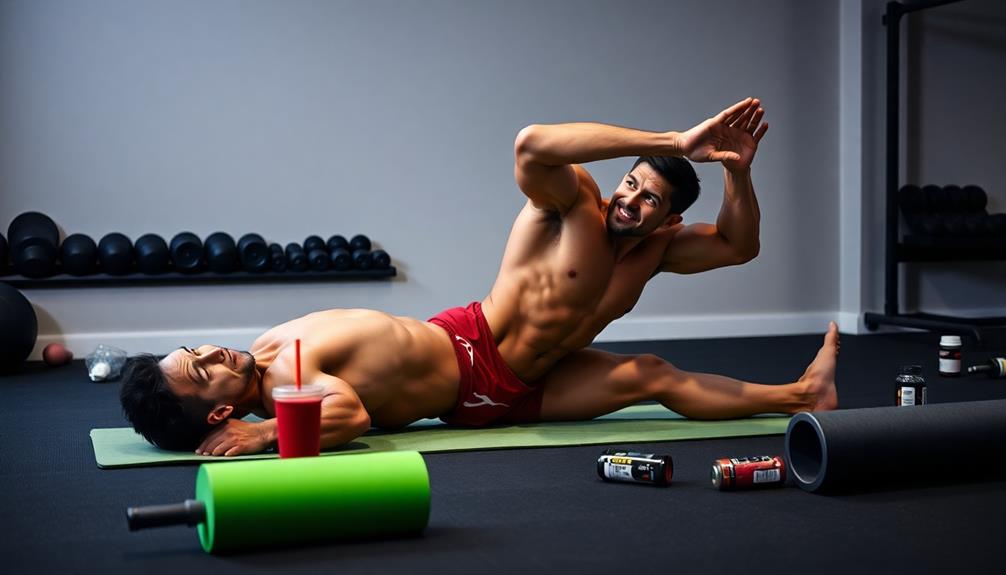To maximize muscle recovery, bodybuilders should incorporate these essential techniques: active recovery, foam rolling, proper nutrition, hydration, quality sleep, contrast therapy, massage, stretching, compression gear, and mindfulness. Active recovery and foam rolling help maintain blood flow and reduce soreness. Proper nutrition and hydration support muscle repair and overall health. Quality sleep is essential for hormone balance and recovery. Contrast therapy and massage improve circulation and reduce inflammation. Stretching enhances flexibility and prevents injuries. Compression gear aids in muscle support and recovery. Lastly, mindfulness techniques help manage stress, which can impede muscle growth. These strategies form a complete approach to ideal recovery.
Core Insight
- Active recovery techniques like light jogging or swimming promote blood flow and reduce muscle soreness.
- Foam rolling helps release muscle tension and improves flexibility when done correctly for 30-60 seconds per muscle group.
- Proper nutrition, including adequate protein intake and balanced macronutrients, supports muscle repair and growth.
- Quality sleep of 7-9 hours per night is crucial for muscle recovery and overall bodily repair.
- Compression gear can reduce muscle swelling, improve blood flow, and aid in faster recovery between workouts.
Active Recovery

Active recovery helps bodybuilders recover from tough workouts. It means doing easy, low-impact activities on rest days to get your blood moving and make your muscles less sore. Foam rollers are great for loosening up tight muscles and making you more flexible. Pick exercises that work the same muscles you've been training, but go easy on them.
Try these active recovery ideas:
- Jog or walk at a comfortable pace
- Swim or do water exercises
- Do some gentle yoga or stretching
- Take a relaxed bike ride
- Do body weight exercises without adding much weight
Foam Rolling
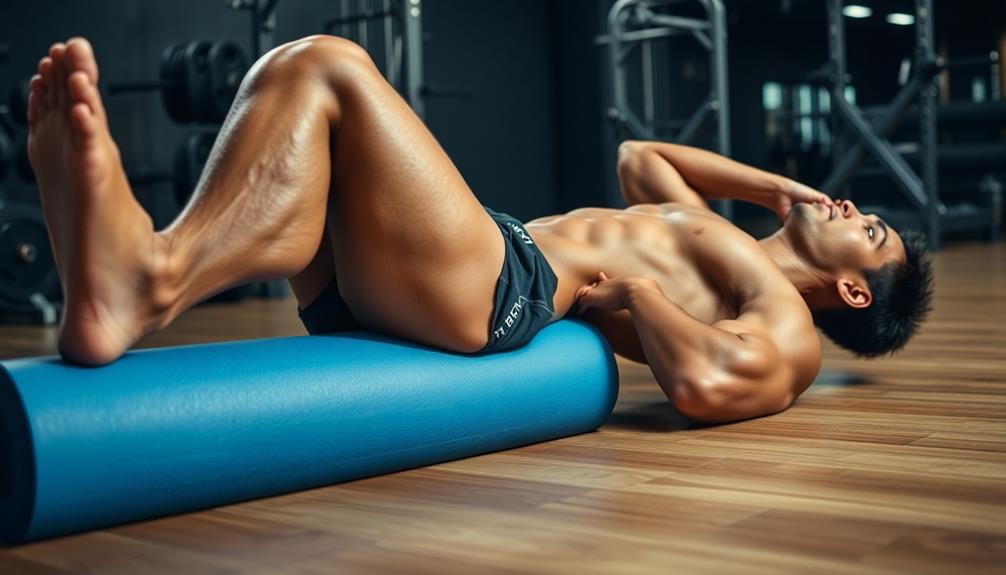
Foam rolling is a simple way for bodybuilders to release tension in specific muscles. It's like giving yourself a massage to improve flexibility, reduce soreness, and recover faster. Foam rolling works best after tough workouts or on rest days. Firm, dense foam rollers provide intense pressure to work out stubborn knots deep in your muscles. Some rollers have bumps or ridges that feel like a massage therapist's hands for even better results.
Follow these tips for effective foam rolling:
- Use light pressure at first, then gradually press harder
- Roll slowly over each muscle for 30-60 seconds
- Focus on areas that feel tight or sore
- Take deep breaths and try to relax
- Don't roll directly on joints or bones
Foam rolling makes a great addition to your warm-up or cool-down routine. It's an excellent tool for relieving muscle knots and tightness, improving circulation and muscle health. For best results, make foam rolling a regular habit.
Proper Nutrition

Eating right is key for muscle recovery in bodybuilding. Focus on getting the right balance of macronutrients (protein, carbs, fat) and micronutrients (vitamins and minerals). Aim to eat 1.6 to 2.2 grams of protein per kilogram of body weight each day to rebuild muscle. Pea protein powder is a good option for plant-based diets.
Don't forget carbs to refuel your muscles and healthy fats to support recovery. Get plenty of vitamin C, D, and zinc which help repair muscles. Drink a lot of water, especially after training. Adding electrolytes to your post-workout drink can help replace what you lose in sweat.
When you eat is just as important as what you eat for proper recovery nutrition. Time your meals and snacks appropriately around your workouts to get the best results.
Hydration
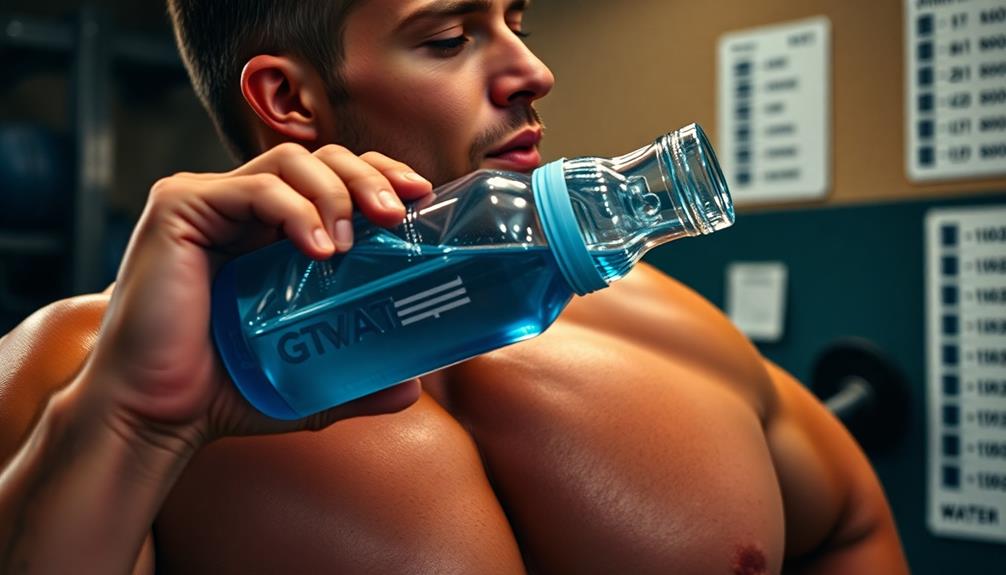
Staying hydrated is crucial for muscle recovery when you're a bodybuilder. Your muscles need water to repair themselves and grow after your workouts. Drinking enough water helps get rid of toxins, move nutrients around your body, and keep your body temperature normal during tough training sessions. Try adding coconut water to your drinks. It has natural electrolytes and potassium that can speed up recovery.
To make sure you're well-hydrated:
- Sip on water regularly throughout the day
- Check that your pee is light yellow
- Drink fluids with electrolytes after hard workouts
- Eat foods with high water content
- Drink more in hot weather or when you're more active
Quality Sleep

Getting good sleep helps your muscles recover. When you sleep, your body makes growth hormone, fixes damaged tissues, and gets energy back. Try to get 7-9 hours of sleep without waking up to get the most out of it.
To sleep better, make a relaxing routine before bed and make your room good for sleeping. Here's a quick guide:
| Time | Activity | Benefit |
|---|---|---|
| 2 hours before bed | Don't use screens | Less blue light |
| 1 hour before bed | Stretch lightly | Relaxes muscles |
| 30 minutes before bed | Read a book | Calms the mind |
| Bedtime | Use dark curtains | Blocks out light |
Contrast Therapy

Contrast therapy is a great way to speed up recovery after quality sleep. It works by switching between hot and cold treatments, which helps blood flow and reduces swelling. You can use gel packs that you can heat up or cool down to target specific areas. Start with heat for 3-5 minutes, then switch to cold for 1-2 minutes. Repeat this 3-4 times, always ending with cold. Contrast therapy can:
- Improve blood flow
- Reduce muscle soreness
- Remove waste from your body faster
- Make you more flexible
- Help you recover quicker between workouts
You can try contrast therapy at home using hot and cold showers or by going back and forth between a hot tub and cold pool. For specific muscles, use heat packs and ice packs. Remember to pay attention to how your body feels and change how long and intense the treatments are if needed.
Massage
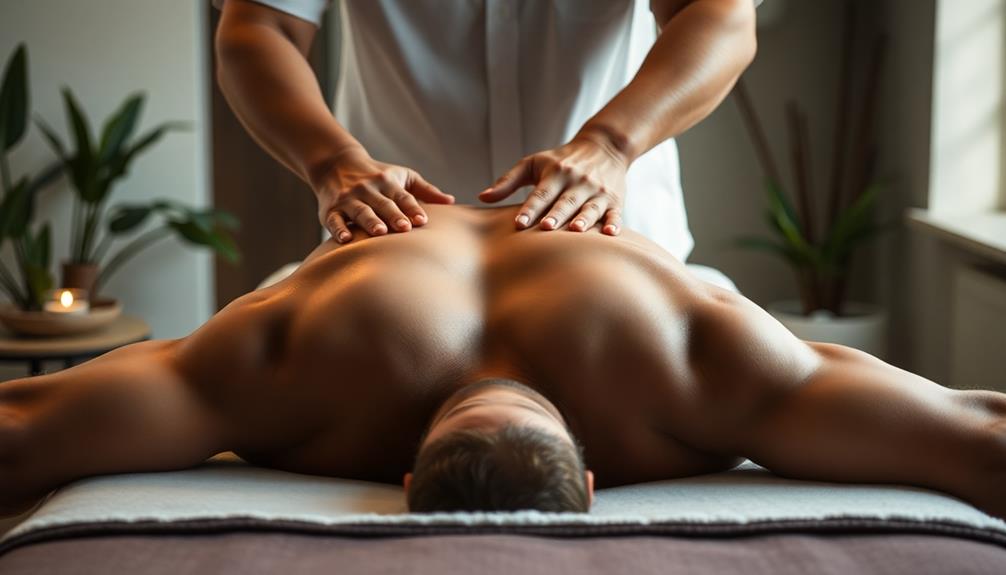
Massage therapy is great for bodybuilders who want to recover faster from tough workouts. It boosts blood flow to your muscles, which helps with soreness and stiffness. Regular massages can also make you more flexible, so you can perform better during training. To get even more relief, try using cooling gel packs along with massage. This will reduce inflammation and speed up recovery.
Here are some types of massage to consider:
- Swedish massage: Gentle strokes to relax muscles
- Deep tissue massage: Gets into the deeper layers of muscle
- Sports massage: Targets specific muscle groups used in bodybuilding
You don't always need to go to a massage therapist. You can do self-massage with foam rollers or massage guns. Try to get a massage at least once a week, focusing on areas that feel tight or sore.
Stretching

Stretching is a great recovery tool for bodybuilders, along with massage. It makes you more flexible, relaxes your muscles, and gets more blood flowing to them. Use both static and dynamic stretching in your routine. Massage balls can also help release tension in specific muscles.
Stretching has five main benefits for muscle recovery:
- Less muscle soreness
- Better range of motion
- More muscle relaxation
- Fewer injuries
- Better overall performance
To get the best results from stretching, focus on the muscles you worked during training. Hold each stretch for 15-30 seconds and repeat it 2-3 times. Remember to breathe deeply and relax as you stretch. It's good to stretch when your muscles are warm, like after a workout or a warm shower.
Compression Gear
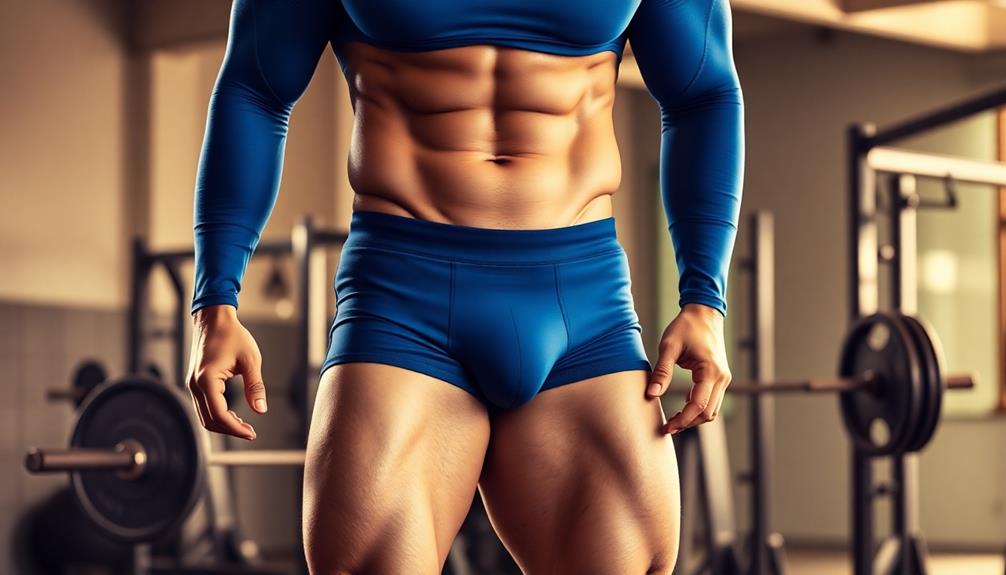
Compression gear is becoming more popular among bodybuilders for muscle recovery. These tight clothes squeeze specific body parts to increase blood flow and lessen muscle soreness. You can find sleeves, socks, and full-body suits. Foam rollers are another good choice for muscle recovery. They deeply massage muscles and can be used with compression gear for better results.
When you use compression gear during or after workouts, it helps:
- Reduce muscle swelling and inflammation
- Get more oxygen to your muscles
- Lower lactic acid buildup
- Keep muscles in the right position
To get the best results from compression gear, pick the correct size so it's snug but doesn't limit movement. You can wear it while exercising or for a few hours afterward. Studies on how well it works are mixed, but many bodybuilders believe compression gear speeds up recovery and decreases muscle soreness.
Mindfulness and Stress Management

Mindfulness and stress management are important for bodybuilders. Too much stress can hurt your sleep, hormones, and muscle growth. Try these tips to relax and recover better:
- Meditate or do deep breathing every day
- Write down things you're grateful for in a journal
- Relax your muscles before bed
- Do yoga to stretch and de-stress
- Set goals you can reach and celebrate your progress
Some supplements called adaptogens may also help your body handle stress. They're natural compounds that support your body's ability to recover. Consider adding them to your routine for even better results.
Frequently Asked Questions
How Long Should I Wait Between Workouts for Optimal Muscle Recovery?
You should typically wait 48-72 hours between workouts targeting the same muscle group. However, it's important to listen to your body. If you're still sore, give yourself more time to recover before your next session.
Can Over-The-Counter Pain Relievers Aid in Muscle Recovery After Intense Workouts?
You can use over-the-counter pain relievers to help with muscle soreness, but they won't directly aid recovery. They'll mask pain, potentially leading to overtraining. It's better to focus on proper nutrition, hydration, and rest for best recovery.
Are There Specific Supplements That Can Enhance Muscle Recovery for Bodybuilders?
Yes, you'll find several supplements that can boost your muscle recovery. Consider trying whey protein, creatine, BCAAs, glutamine, and omega-3 fatty acids. They'll help reduce muscle soreness, promote protein synthesis, and speed up your recovery process.
How Does Age Affect Muscle Recovery Time in Bodybuilding?
As you age, your muscle recovery time increases. You'll notice slower healing, decreased hormone production, and reduced protein synthesis. Your body's ability to repair and grow muscle tissue diminishes, requiring longer rest periods between intense workouts.
Can Electrical Muscle Stimulation (Ems) Devices Improve Recovery for Bodybuilders?
EMS devices can potentially improve your recovery as a bodybuilder. They're believed to increase blood flow, reduce muscle soreness, and promote muscle relaxation. However, you shouldn't rely solely on EMS; it's best used alongside other recovery methods.

